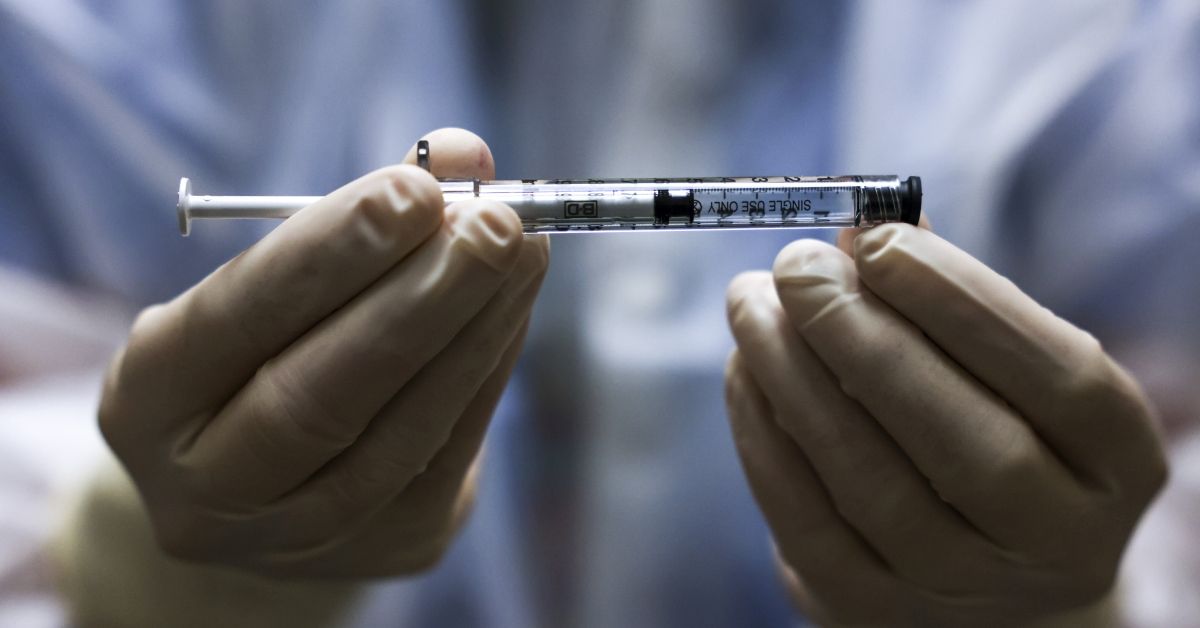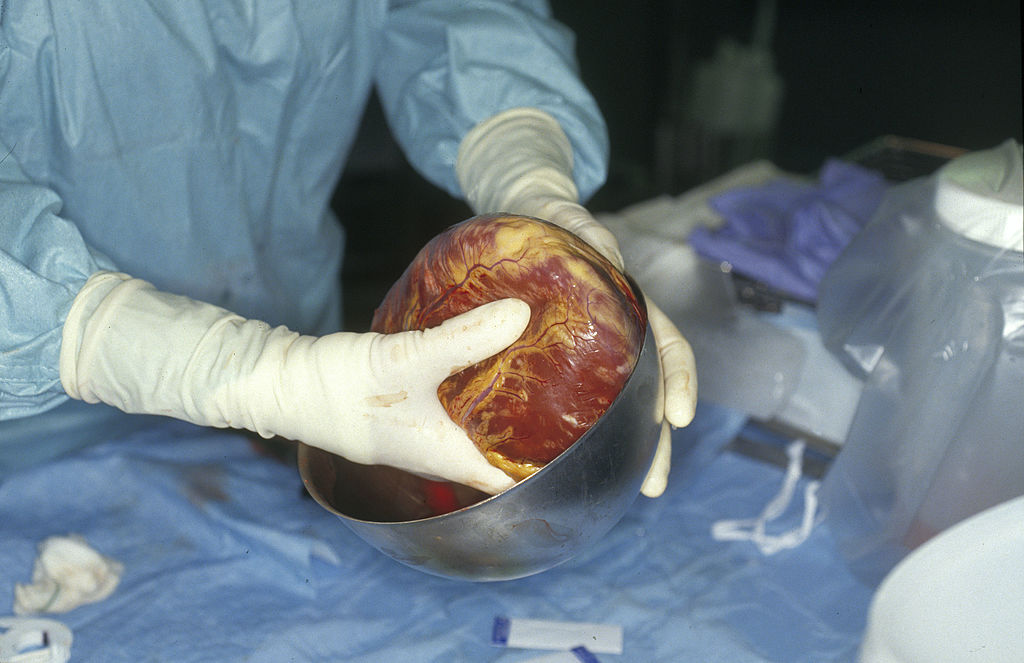Though not mentioned in many news reports, organ transplant centers have, for many years, required would-be recipients to be vaccinated against various diseases, now including COVID-19. This helps maximize the likelihood of a successful transplant, and life expectancy after surgery. Furthermore, the patient in question does, in principle, have the option of applying to various other transplant centers, though they might have the same COVID-19 vaccination requirement.
In January 2022, a controversy emerged in Boston when the family of a 31-year-old man, David "DJ" Ferguson, protested that a local hospital had removed him from its list of heart transplant recipients, because he had refused to be vaccinated against COVID-19.
On Jan. 25, for example, the Daily Mail reported that:
An unvaccinated and gravely ill 31-year-old father-of-two has been taken off the donor list for a heart transplant by a Boston hospital because he 'does not believe' in the COVID vaccine. DJ Ferguson, who has a hereditary heart condition that causes his lungs and heart to fill with blood and fluid, was denied the life-saving organ transplant by Boston Brigham and Women's Hospital, a teaching hospital of Harvard Medical School.
The hospital said it removed Ferguson from the donor list because all transplant recipients need to get the vaccine in order to "create both the best chance for successful operation and also the patient’s survival after transplantation."
Similar articles were published by BBC News, the New York Post, the Daily Beast, and Sky News, among others.
Those accounts accurately stated the core facts of the case: Ferguson did require a heart transplant, and Brigham and Women's Hospital did remove him from the recipient list because he refused to get a COVID-19 vaccine. We are issuing a rating of "True." However, many reports did not explain well to readers some important pieces of context.
Firstly, the decision to remove Ferguson from the transplant list was not part of a new, politicized moral crusade against COVID-19-unvaccinated individuals, in particular. Rather, it was just the latest manifestation of a broader, long-standing approach — set out in professional guidelines — of attempting to maximize the likelihood of a given transplant being successful, by requiring individuals to take certain actions or give up statistically risky behaviors (such as smoking or drinking alcohol) in advance. This ethical imperative becomes even more acute in a scenario where the demand for organ transplants outstrips the supply — meaning some prioritization is unavoidable.
Secondly, in principle, Ferguson has the option of applying for a heart transplant with another provider. Though he might encounter similar barriers at other hospitals if he continues to refuse to be vaccinated against COVID-19, this is an important fact that many news reports ought to have included, but did not.
What the Hospital Said About the Decision To Deny Ferguson a Heart Transplant
Though Brigham and Women's Hospital did not name Ferguson, they repeatedly gave tacit confirmation that they had indeed removed him from the list of would-be recipients, by providing the following statement to various media outlets, including Snopes. In the interests of providing comprehensive context, we're including the full statement here:
At Brigham and Women’s Hospital, we are committed to providing the most appropriate care for our patients with advanced heart disease and do everything possible to effectively improve heart function without a heart transplant. The journey to transplantation is often long because of the shortage of available organs compared to recipients in need, but we work with patients and their families to make each step of the transplant process as comfortable as possible.
There are currently more than 100,000 candidates on waitlists for organ transplantation and a shortage of available organs — around half of people on waiting lists will not receive an organ within five years. There is no candidate who is “first on the list” since there are varying levels of priority for allocation of organs. Waitlists are ever-changing and are based on many patient and donor factors. Patient criteria includes immunologic and blood factors, psychological and social factors, medical and surgical factors, and clinical condition. When an organ does become available, it must be carefully matched among a regional and national pool of candidates based on many factors, including blood type, height, weight, medical factors, distance to the recipient and organ size.
Given the shortage of available organs, we do everything we can to ensure that a patient who receives a transplanted organ has the greatest chance of survival. Our Mass General Brigham healthcare system requires several CDC-recommended vaccines, including the COVID-19 vaccine, and lifestyle behaviors for transplant candidates to create both the best chance for a successful operation and to optimize the patient’s survival after transplantation, given that their immune system is drastically suppressed. Patients are not active on the waitlist without this. Research has shown that transplant recipients are at a much higher risk of dying from COVID-19 when compared to non-transplant patients. This guidance is in alignment with recommendations from the American Society of Transplantation, American Society of Transplant Surgeons and International Society for Heart and Lung Transplantation.
The key portion of that statement was the one that declared that Brigham and Women's Hospital (BWH) "requires several CDC-recommended vaccines, including the COVID-19 vaccine, and lifestyle behaviors for transplant candidates... Patients are not active on the waitlist without this." Since Ferguson has, by his own account, thus far refused any COVID-19 vaccine, there can be little doubt that the hospital had turned down his application, and had done so on that basis.
However, BWH's statement did appear to refute one particular claim, namely that Ferguson's name had been at the "top" of the transplant list. Rather, the hospital wrote, "There is no candidate who is 'first on the list' since there are varying levels of priority for allocation of organs."
What Are the Medical and Ethical Reasons Hospitals Require Vaccinations Before Organ Transplants?
It's worth noting a subtle but important distinction at work here: BWU's decision was likely based not so much on the fact that Ferguson was unvaccinated, but rather that he was refusing to get vaccinated.
Brendan Parent, a professor of bioethics at New York University's Grossman School of Medicine, explained to Snopes how hospitals typically give patients the chance to become compliant:
In most circumstances, if a patient is unable to demonstrate abstinence from behaviors that could negatively impact transplant success, such as smoking or drinking, they would not be listed for transplant in the first place. It is usually the case that centers would give the patient an opportunity to demonstrate abstinence, with support, as opposed to denying them outright.
Similarly, patients would not be listed for transplant unless they receive necessary vaccine to improve chances of transplant success. It is possible that a patient who is listed for transplant could be de-listed if they demonstrate continuous behaviors that could reduce the chance of transplant success, despite repeated opportunities to change these behaviors.
Arthur Caplan, also a bioethicist at NYU, told Snopes that COVID-19 vaccine policies such as the one enacted in Ferguson's case did not derive from a "battle to penalize the unvaccinated," nor were they "made up to discriminate against" patients such as Ferguson. Rather, the policies were based on long-standing guidelines issued by the relevant authorities.
In October 2021, for example, the American Society of Transplant Surgeons published a "position statement" on this very subject, which explained the ethical and medical basis for requiring COVID-19 vaccination among would-be transplant recipients.
In brief, the ASTS argued that COVID-19 was particularly lethal among transplant recipients, that vaccination helped lower the risks from contracting COVID-19, and that requiring COVID-19 vaccination would simply mean adding one more vaccination to an existing, long-standing list of vaccinations already required for would-be organ transplant recipients.
The specific medical reason why transplant recipients were particularly at risk of being infected and sickened with COVID-19 was largely unmentioned in news reports about the plight of Ferguson in January 2022, but it is another important detail here.
After transplant surgery, patients are given "anti-rejection" medicines that are intended to encourage the body to accept a transplanted organ. By definition, these medicines work by suppressing a patient's immune response, meaning they also leave the body exceptionally vulnerable to infection and illness. Thus, hospitals have for many years required would-be transplant recipients to get vaccinated against several diseases, as a prerequisite to surgery.
In other words, what is new in this set of circumstances is not so much the introduction of COVID-19 vaccination as a prerequisite for an organ transplant, but rather the extraordinarily high volume of misinformation and disinformation that has been spread about this particular vaccination, as opposed to the others.
Finally, another aspect of this story that many outlets did not properly report: the availability of other transplant centers. Each transplant program makes its own decisions about the status of transplant recipients, though they typically follow the same basic ethical guidelines. As such, Ferguson could, in principle, apply to another transplant center, provided he can find one that does not require COVID-19 vaccination as a prerequisite.
When applicants are accepted for organ transplant, they get placed on a national list, known as the Organ Procurement and Transplantation Network, where a nonprofit called the United Network for Organ Sharing (UNOS) oversees the entire organ donation system, and seeks to match transplant recipients with the correct donor, and so on. A spokesperson for UNOS explained how "transferral" between different transplant programs works:
Transplant hospitals decide which patients to add to the waitlist based on their own criteria and medical judgement to create the best chance for a positive transplant outcome, with the understanding that the patients will be active participants in their medical care. The transplant team at each program has its own standards for accepting candidates, and if one program is not willing to accept a patient as a candidate, a different program may. Patients have the right to seek transplant at an alternate center. However, the requirements may be the same.
Curious about how Snopes' writers verify information and craft their stories for public consumption? We've collected some posts that help explain how we do what we do. Happy reading and let us know what else you might be interested in knowing.


